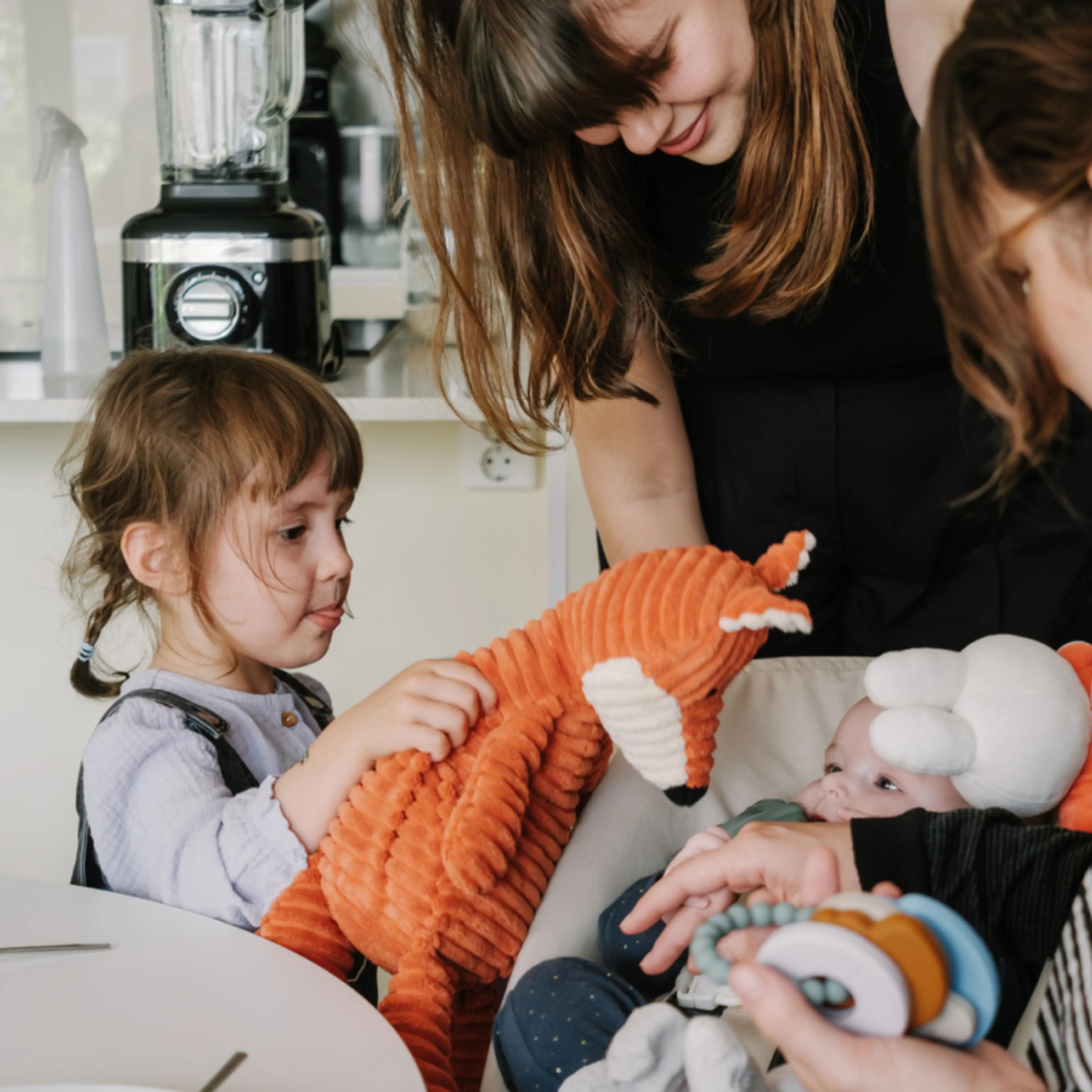The first time I got the dreaded midday call from daycare, I panicked. I was in the middle of a meeting when I saw the center’s number flash across my phone and answered in a hurry.
“Violet has a fever…,” said the voice on the other line. My keys were in my hand and I was out the door before the daycare director could finish her sentence. My baby needed me. She wasn’t feeling well and I had to get to her as soon as possible.
Once home, I immediately fell down a spiral of guilt and shame. Earlier that day, I noticed she didn’t seem like her usual self, but I brushed it off. I ignored my instinct. After all, I had a job to get to once I dropped her off. But when I got The Call, I mentally berated myself.
When I relayed the story to my therapist at our next session, she asked me exactly how I could’ve known that my daughter would get a fever. “It’s not like you can predict the future,” she told me. But I insisted that I should’ve known. “Good Moms” inherently know, I thought. They always know exactly what their baby needs at any given time and they act accordingly.
This self-blame and self-doubt isn’t exactly new when it comes to first-time moms. A recent study1 found a positive correlation between low self-esteem and depression in postnatal women. I could certainly relate. As a lifetime perfectionist and overachiever, I’ve placed a lot of my self-worth in how well I was performing whether it be in school, at work, or even in my personal life (heck, I even wrote a book2 about it). But nothing has humbled me quite like becoming a mom.
“So many of us use perfectionism in other aspects of our lives, such as our career, school, exercise, and our health,” says Dr. Adia Gooden, a Chicago-based clinical psychologist, author, podcast host, and mom. “Then we just transfer that perfectionism over to trying to conceive, pregnancy, early motherhood, etc. It’s a way of moving through the world and navigating goals and challenges.”
But left unchecked, this constant striving toward perfectionism can negatively impact your mental and physical health.
“Perfectionism is a self-protection strategy,” explains Gooden. “We think that if we just do everything perfectly we won’t be criticized, we won’t make a mistake, we won’t experience failure or disappointment. We’re trying to manage our anxiety by seeking to control an uncontrollable situation.”
As if our own anxiety isn’t enough, there are constant reminders on social media, in our friend circles, and even from our own families of what a “good mother” looks like and how she behaves.
“There are a lot of conflicting messages,” Gooden says. “And if you’re an overachiever you may feel like ‘I should be doing all of these things perfectly.’ There’s a sense of, ‘If I don’t get it right, not only will I be criticized by society and my family, but also I may fail my child.’”
So how do we overcome self-doubt and perfectionism as new parents? Here are three strategies that can help ground you when you’re feeling overwhelmed.
Focus More on the “Being” Than the “Doing”
Between regulating screen time and buying all the Montessori playsets, there’s a lot of emphasis (and, let’s be honest, marketing) that factors into “perfect parenting.” To help combat this never-ending to-do list, Gooden suggests caregivers focus more on being present rather than how much they’re doing.
“There are certain things you have to do to conceive, have a healthy pregnancy, and take care of a newborn. Ultimately, I think the quality of our mothering is really more determined by how we’re being with our children and ourselves,” she says. “When we get caught up in the doing and we forget about being present, that’s when we lose sight of what’s really important.”
Instead of becoming consumed with the proverbial Good Mom Checklist, Gooden encourages parents to pay greater attention to the intention behind their actions than the item or task itself.
“Usually the intention is: I want my child to be safe, happy, and well. And we think, ‘I have to do everything perfectly in order to make that happen,’” she says. “But the truth is you don’t have to do everything perfectly for your child to be safe, happy, and well…You will make mistakes along the way, and that’s part of what teaches you what your child needs.”
Be Kind to Yourself
In our culture, there’s so much focus on pregnancy that moms often feel overlooked and forgotten when it comes to the fourth trimester (the first 12 weeks following birth) and the fifth trimester (the end of parental leave and return to the workforce).
“Looking back at those early days, I was in a total haze. You’re just trying to make your way in the dark and keep the child alive, keep yourself alive,” Gooden says. “We live in a society that is not set up for new moms. Other cultures have a tradition of resting, but we live in a culture that is about bouncing back so there’s another layer of, ‘maybe I should be doing all of these things that I used to be doing.’”
Rather than try to do all the things during naptime (I know I’m not the only one), give yourself permission to rest—whether that’s catching up on the latest Netflix show or, gasp, taking a nap yourself. Remember, you don’t always have to be on and it’s okay to ask for help.
Embrace the Chaos
Before becoming a parent, I was an extremely punctual person. “To be early is to be on time, to be on time is to be late, and to be late is unacceptable,” as my dad used to say. Now I know to build in a 15- to 20-minute buffer whenever we’re leaving the house with the baby.
“We need to normalize that those first few months are going to be a mess—both literally and figuratively,” Gooden says. “There’s going to be poop. There’s going to be vomit. There’s going to be all these things. But all you can do is take it one step at a time, one day at a time, one nap at a time, one hour at a time. That’s how you’re going to get through this.”
And if you feel like you have no idea what you’re doing, you’re not alone. Self-doubt comes with the territory of becoming a parent—it doesn’t mean you’re a failure.
“If you’re used to being on top of things, getting things done, and generally being organized, becoming a parent adds a whole other layer of anxiety and stress,” Gooden says. “You’ll see other people have these precious newborn pictures where they’re dressed up and have makeup on, meanwhile you’re struggling to make it through the day and you feel like, ‘What am I doing wrong?’ That is all perfectly normal.”












